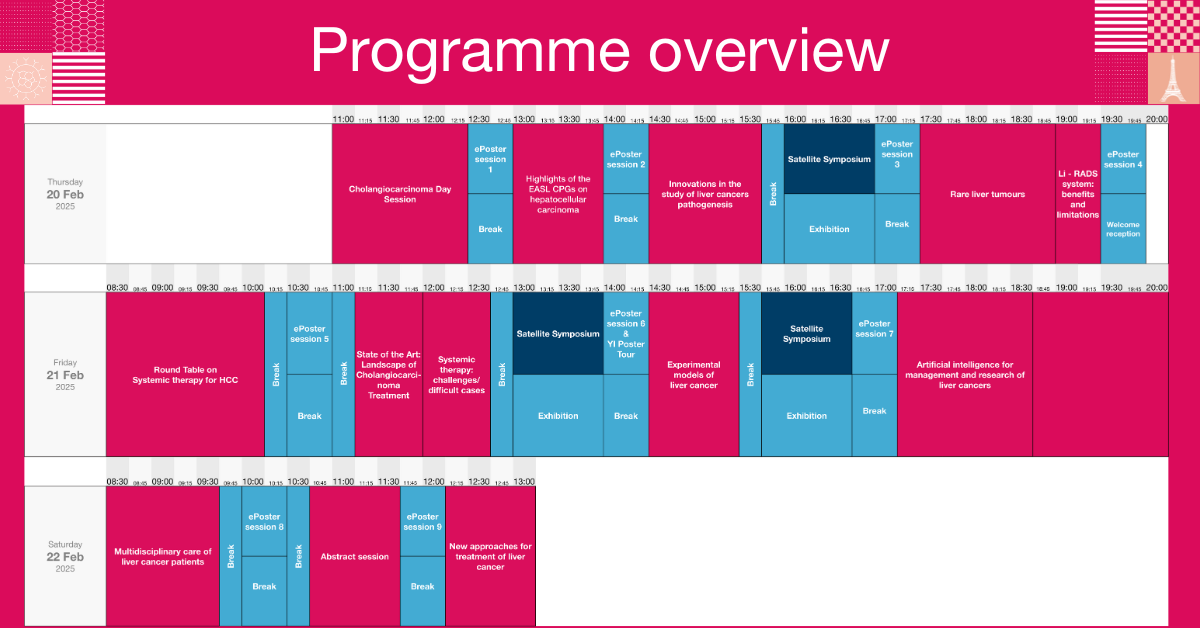Discover the Scientific Programme
The 2025 EASL Liver Cancer Summit in Paris covered the latest advancements in liver cancer research and treatment. Day 1 highlights included a focus on Cholangiocarcinoma, innovative technologies in cancer pathogenesis, and the benefits and limitations of the LI-RADS system for diagnosing liver lesions.
Day 2 delved into systemic therapies for challenging HCC cases, the current treatment landscape for Cholangiocarcinoma, and experimental models in liver cancer research. It also explored the transformative potential of artificial intelligence in patient care. Day 3 emphasized multidisciplinary patient care and reviewed new EASL guidelines for HCC management, emerging drug treatments, and innovative approaches to liver transplantation.
Programme overview
Discover the sessions
Session 1: Cholangiocarcinoma Day Session
The first session of the meeting will serve to celebrate CCA day. Results of a collaborative effort to analyze inequalities in the management of patients with biliary cancers across Europe will be presented. Other relevant clinical aspects of patient management will be discussed.
Learning objectives: Understand the challenges and controversies in the management of patients with biliary cancer.
Session 2: Innovations in the study of liver cancers pathogenesis
Novel and innovative technologies now allow researchers to have an unprecedented view of the molecular biology of primary liver cancers. The session will take a deep dive into how we can leverage these cutting-edge approaches to make significant scientific discoveries that will ultimately lead to improve clinical practice.
Learning objectives: Understand the main advantages and limitations of novel high-throughput molecular technologies.
Session 3: Rare liver tumours and Li - RADS system: benefits and limitations
This session will discuss a highly relevant issue: the non invasive radiological diagnosis of lesions at risk of HCC. Should non invasive diagnosis with imaging be always pursue? And if yes which diagnostic system is to be adopted? Strict monitoring of inconclusive lesions or large use of biopsy is the way to go? This questions be reviewed by discussing the approach of the Liver Reporting and Archive Data System proposed by the American College of Radiology and endorsed by the AALSD.
Learning objectives: Attendees will learn the advantages of using the LI RADS approach for the classification of lesions at risk of HCC, but also the limitation of a non critical adoption.
Session 4: ROUND TABLE ON Systemic therapy for HCC
Session 1 of day 2 will illustrate how to treat difficult HCC patients with systemic therapy. Probably the majority of advanced HCC patients, in need for systemic therapy, would not be candidate for enrolment in clinical trials. Therefore, the best treatment modality for such patients remains unexplained by the literature and guidelines. This session will therefore report expert opinions on how to treat some exemplary cases and how to reach a consensus
Learning objectives: Attendees will improve their capacity on how to choose systemic therapy for HCC patients with comorbidities, not ideal candidates for such therapies, but with no better option than drug treatment.
Session 5: State of the Art: Landscape of Cholangiocarcinoma Treatment and Systemic therapy: challenges/ difficult cases
This session includes the state of the art on the CCA treatment landscape and discussion on the choice of systemic treatments in difficult cases. Two oral communications related to the topic will be presented.
Learning objectives: Attendees will improve their capacity on how to choose systemic therapy for CCA patients with comorbidities, not ideal candidates for such therapies, but with no better option than drug treatment.
Session 6: Experimental models of liver cancer
The assessment of in vivo experimental models that mimic the natural history of liver cancers is key to develop novel therapeutic strategies In this session cutting-edge ex vivo and in vivo approaches of liver tumors will be presented. Their advantages, and limitations in fundamental research, will be thoroughly discussed.
Learning objectives: Understand the main steps involved in the development of organoids/tumoroids, patient derived xenografts and organs on a chip and their potential applications in liver cancer research.
Session 7: Artificial intelligence for management and research of liver cancers
Artificial intelligence is likely to profoundly change the way we care for liver cancer patients. The session will review its main potential implications, including clinical records and imaging, and will also address key points (ethics and uncertainty in AI predictions).
Learning objectives:
- Understand how AI can be leveraged to improve data collection, analysis and ultimately patients care.
- Know the main ethical and uncertainty issues linked to AI predictions.
Session 8: Multidisciplinary care of liver cancer patients
This session will give voice to other stakeholders in multidisciplinary patient care of patients with liver cancer: patients themselves and nurses, as well as discuss aspects of adverse event management.
Learning objectives:
To know other aspects related to patient management that can help improve patient care or decision making.
Session 10: New approaches for treatment of liver cancer
Session 3 of day 3 will be devoted to the recap of the current HCC management landscape through the newly released EASL guidelines and to a view on the future to come. The latter field in particular will address on one side the basic science issue of new emerging molecular treatment targets and on the other side, clinically relevant, the perspective of an unprecedented approach to liver transplantation for patients with advanced HCC, but dramatic objective response to locoregional and drug treatments and their combination.
Learning objectives: The attendees will be informed about the content of the new HCC EASL guidelines. They will learn which potential new drugs could become relevant in the future for clinical investigations and will become informed in which circumstances patients with advanced HCC may become eligible for consideration for liver transplantation.


